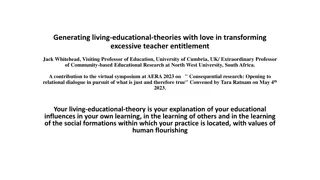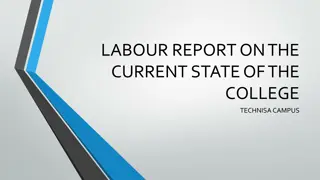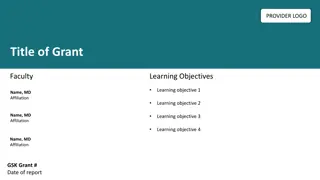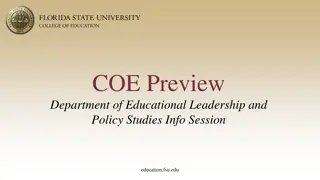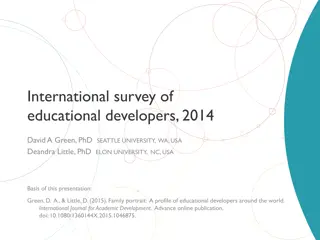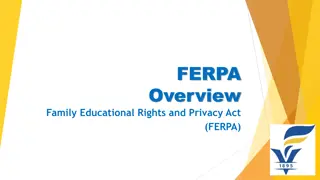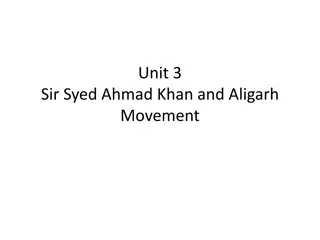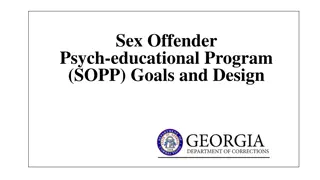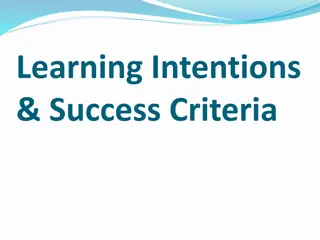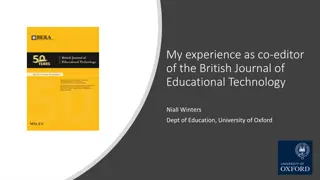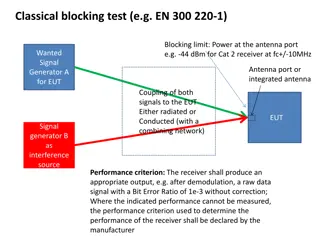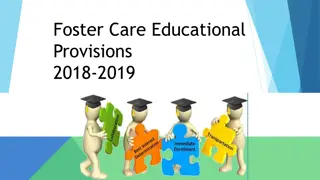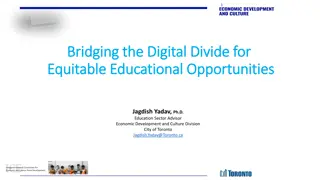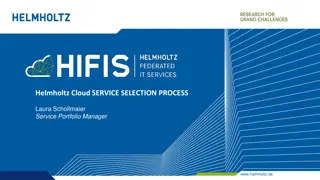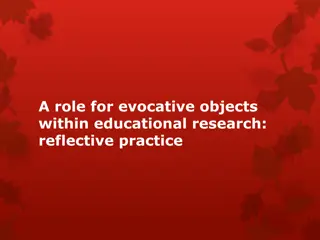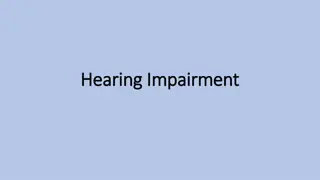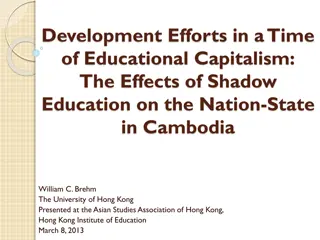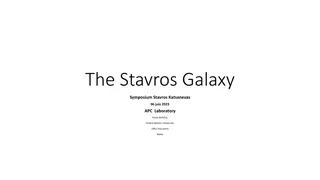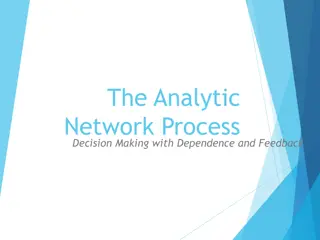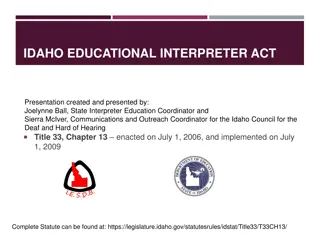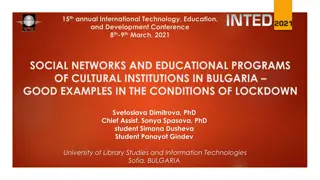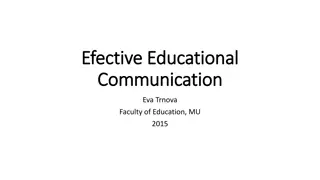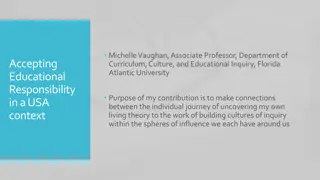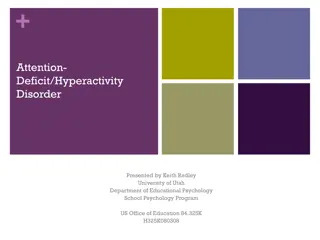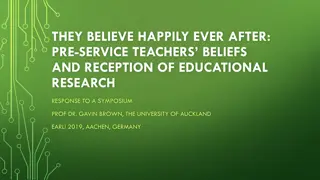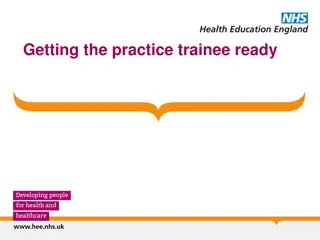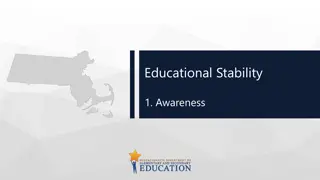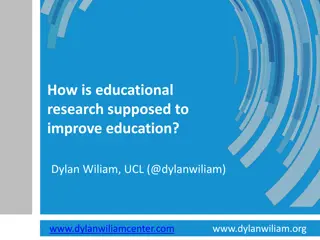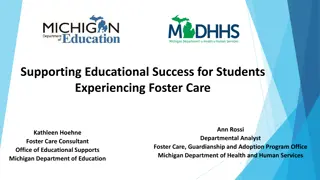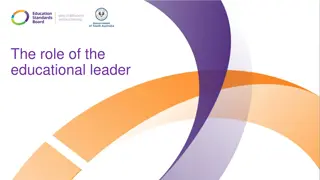Enhancing Educational Resilience with RESTA Model
RESTA is an evidence-based intervention model designed to boost Educational Resilience in young individuals by involving educational staff. It differs from other support models by incorporating insights from educational resilience and trauma-responsive practices. Two underpinning models and RESTA pr
0 views • 12 slides
Understanding Major Approaches to Educational Planning
Educational planning involves forecasting needs and setting up frameworks for national action. It plays a crucial role in linking education with economic development. Four major approaches to educational planning include Manpower Planning, Social Demand, Rate of Returns, and Social Justice approache
2 views • 11 slides
Doctorate in Applied Educational and Child Psychology Programme Open Evening
Join the Doctorate in Applied Educational and Child Psychology programme at the University of Birmingham for an insightful open evening on October 5th, 2023. Meet the programme director, Dr. Anthea Gulliford, and academic/professional tutors Dr. Anita Soni and Dr. Siya Mngaza. Learn about educationa
1 views • 33 slides
Transforming Teacher Entitlement through Living Educational Theories with Love
Explore the transformative power of living-educational-theories in addressing excessive teacher entitlement with values of human flourishing. Learn how Consequential Educational Research reshapes our understanding of impact and success in educational practices, focusing on influencing cognitive grow
0 views • 6 slides
Overview of Educational Transformation at Technisa Campus
Educational transformation at Technisa Campus involves systematic changes in the educational model with a focus on providing unique opportunities for student growth and development. The campus management team, programme managers, and total staff numbers are highlighted. The college places emphasis o
1 views • 11 slides
Employee Educational Benefits Policy and Programs Overview
This document outlines the Employee Educational Benefits Policy that includes tuition waiver, assistance, and reimbursement programs. It explains the types of educational assistance available, eligibility criteria for employees, and the process to utilize the waiver and assistance programs. It also
4 views • 12 slides
Grant Educational Outcomes and Practice Changes Report
This report showcases the educational outcomes, HCP insights, top educational gaps, and practice changes and barriers related to a specific grant program. It includes details on faculty, learning objectives, learner breakdown, educational gaps, knowledge and competence changes, potential patient imp
0 views • 10 slides
Educational Leadership and Policy Studies at FSU Information Session
Department of Educational Leadership and Policy Studies at Florida State University acknowledges and respects the indigenous lands on which the university stands. They focus on educational improvement through interdisciplinary programs, research, and preparing leaders for creating learning environme
3 views • 46 slides
International Survey of Educational Developers: Insights and Trends
Explore findings from the 2014 international survey of educational developers, revealing key demographics, institutions, roles, and disciplinary data. Discover insights on gender, age, continental location, and the most valued criteria at educational institutions. The survey offers a comprehensive s
0 views • 19 slides
Understanding FERPA: Family Educational Rights and Privacy Act
FERPA, the Family Educational Rights and Privacy Act, is a federal law that safeguards the confidentiality of student educational records and privacy rights. It grants parents rights until the student turns 18 or enters a postsecondary institution. Students can inspect records, seek amendments, cons
0 views • 19 slides
Sir Syed Ahmad Khan: The Pioneer of Educational Reform in India
Sir Syed Ahmad Khan, a prominent Muslim scholar and reformer, played a crucial role in awakening the Muslim community to strive for educational upliftment and societal progress. Despite facing financial challenges, he excelled in various fields of study and contributed significantly to improving edu
0 views • 44 slides
Understanding the Sex Offender Psych-educational Program (SOPP) Goals and Design
The Sex Offender Psych-educational Program (SOPP) focuses on providing psycho-educational sessions for offenders, emphasizing accountability, harm recognition, and behavior control. The program aims to address the abuse of power inherent in sexual offenses and facilitate discussions on responsible c
1 views • 4 slides
Understanding Learning Intentions and Success Criteria
Learning intentions and success criteria play a crucial role in enhancing student focus, motivation, and responsibility for their learning. Research indicates that students benefit greatly from having clear learning objectives and criteria for success. Effective learning intentions should identify w
1 views • 24 slides
Insights from Co-Editing the British Journal of Educational Technology
Co-editor's experience at the British Journal of Educational Technology, highlighting the journal's focus on theoretical perspectives, methodological developments, and empirical research in educational technology. Details on the publication process, criteria for submission, and key themes explored b
0 views • 19 slides
Classical Blocking Test and Receiver Performance Criteria
Classical blocking test procedures such as EN 300.220-1 outline limits on power at the antenna port for receivers, with criteria for achieving desired performance levels without errors. Manufacturers must declare appropriate performance criteria for devices, even if certain performance metrics are n
0 views • 6 slides
Ensuring Educational Stability for Students in Foster Care
Educational stability is crucial for students in foster care to prevent lasting impacts on their academic, social, and emotional well-being. The provisions outlined in Title I Part A ensure specific educational rights and establish points of contact to support these vulnerable students. It is essent
0 views • 25 slides
Addressing the Digital Disparity in Education for Equitable Opportunities
Jagdish Yadav, Ph.D., an Education Sector Advisor in Toronto, discusses the digital divide in the context of educational equity. The presentation outlines the common dividers in Toronto, main reasons for the digital gap, educational realities pre and post Covid-19, and the significant impacts of the
1 views • 11 slides
Update on CAR T-Cell Therapy and Approval Criteria Changes
Recent updates regarding CAR T-cell therapy include details on patient referrals, treatments, and changes to approval criteria. The information highlights patient outcomes, referral processes, and criteria updates for various types of lymphomas. It also discusses the importance of monitoring and adj
2 views • 9 slides
HelmholtzCloud Service Selection Process Overview
The Helmholtz Cloud Service Selection Process is detailed through service surveys, iterations, criteria types, and exclusion processes. Service providers deliver data, weighting and selection criteria are applied, and candidate services are listed based on surveys and integrations. Criteria categori
0 views • 41 slides
Evocative Objects in Educational Research: A Reflective Paradigm
Delve into the role of evocative objects in educational research through a reflective practice approach, exploring generative and divergent analysis models, and considering alternative quality criteria. The creative analytic paradigm emphasizes the serendipitous nature of engaging with objects for a
0 views • 21 slides
Understanding Hearing Impairment and Its Impact on Education
Hearing impairment, whether permanent or fluctuating, can adversely affect a child's educational performance. In the educational context, terms like deafness, hard of hearing, and hearing loss are used instead of hearing impairment. Eligibility criteria for special education services under IDEA requ
0 views • 11 slides
Shadow Education and Educational Capitalism in Cambodia
Exploring the impact of shadow education on the nation-state in Cambodia, this analysis delves into the complex interplay between educational development, compulsory schooling, privatization practices, and the emergence of educational capitalism. It questions the traditional notions of nation-state
0 views • 8 slides
Glasgow Health & Social Care Partnership Carer Support Criteria
The Carers (Scotland) Act 2016 mandates the implementation of eligibility criteria by Health & Social Care Partnerships to address carer needs effectively. Glasgow's eligibility criteria prioritize fair resource allocation based on carers' identified support needs. Key principles include universal c
0 views • 8 slides
Innovative Educational Actions and Impact at Stavros Galaxy Symposium
Explore the poetic inspiration of Stavros in Sifnos, his regeneration place, and delve into the impactful educational activities initiated since 2017 in collaboration with APC Lab, CNRS, GENERA team, and EGO colleagues. From biodiversity forums to gender equality initiatives to educational forums at
0 views • 5 slides
Nutrient Criteria Development Plan for High Rock Lake Summary Update
Nutrient Criteria Development in North Carolina has evolved through various stages since 2001, with the key milestones being the development of the Nutrient Criteria Implementation Plan in 2004 and the Nutrient Criteria Development Plan in 2014. The plan aims to link nutrient concentrations with the
0 views • 8 slides
Analytic Network Process: Decision Making and Feedback
Explore the Analytic Network Process for decision-making with dependence and feedback. Compare hierarchical and network models, prioritize criteria in AHP and ANP, establish car priorities based on criteria, and employ feedback to link alternatives to criteria for preference. Make pairwise compariso
0 views • 19 slides
Idaho Educational Interpreter Act Overview
Idaho Educational Interpreter Act was enacted in 2006 to improve interpreting services in public schools for students who are deaf, hard of hearing, or deaf-blind. The act defines qualifications for educational interpreters, including specific criteria for Sign Language, Oral Transliterators, and Cu
0 views • 25 slides
Grading Criteria for Effort and Behavior in Educational Reporting
Effort and behavior in educational settings are evaluated based on criteria ranging from Excellent to Causing Concern. Pupils demonstrating excellent behavior show respect, responsibility, and positive engagement in learning. Those with good behavior exhibit cooperation and respect for others, albei
0 views • 9 slides
Social Networks and Educational Programs of Cultural Institutions in Bulgaria: Examples During Lockdown
This paper explores the impact of the COVID-19 lockdown on educational initiatives in cultural institutions in Bulgaria, highlighting the use of social networks and virtual platforms for engaging audiences. Researchers from the University of Library Studies and Information Technologies in Sofia disc
0 views • 16 slides
Explore the Diverse Educational Offerings at Mkhitar Sebastatsi Educational Complex
Discover a dynamic educational complex, Mkhitar Sebastatsi Educomplex, offering a multilingual website, e-magazines, online TV and radio, eight distinct schools, educational projects, and various educational clubs for high schools. The institution fosters creativity and excellence through a range of
0 views • 18 slides
Proposal to Update New Mexico Water Quality Standards: Copper Site-Specific Water Quality Criteria for the Pajarito Plateau
Develop a proposal for the New Mexico Water Quality Control Commission to adopt EPA's 2007 recommended copper ambient water quality criteria, focusing on the history of U.S. EPA aquatic life criteria for copper, the use of the BLM tool in aquatic toxicology, and the overview of proposed site-specifi
0 views • 10 slides
Understanding the Differences Between Educational Communication and Social Communication
Educational communication focuses on conveying specific meanings within social behavior in the educational context, involving teachers, students, and parents. It is situation-specific and utilizes verbal, non-verbal, and action-based communication tools. Social communication shares similar content w
0 views • 24 slides
Cultivating Cultures of Inquiry in Education
Associate Professor Michelle Vaughan from Florida Atlantic University discusses the importance of accepting educational responsibility and building cultures of inquiry within educational institutions. She emphasizes values like vulnerability, authentic connection, mindful questioning, and loving edu
0 views • 4 slides
Understanding ADHD Subtypes and Diagnosis Criteria in DSM-IV-TR
ADHD, as defined in the DSM-IV-TR, encompasses three subtypes: Predominantly Inattentive Type, Predominantly Hyperactive-Impulsive Type, and Combined Type. To meet diagnostic criteria for each subtype, specific symptoms must be present for a certain duration and at a degree that is maladaptive. Indi
0 views • 23 slides
Pre-Service Teachers' Beliefs and Reception of Educational Research
Exploring the awareness and trust of pre-service teachers in educational psychology misconceptions, epistemic trust in educational scientists, questioning prior beliefs when faced with evidence, and beliefs about the instrumental quality of information sources for teaching. The symposium delves into
0 views • 10 slides
Criteria for Preparing a Medical Practice Trainee
In preparation for practice trainees, several areas must be considered such as the premises, equipment, and criteria for trainers' visits and peer appraisals. Key points include ensuring adequate facilities, supervision, clinical experience, and engagement in educational activities. The trainer shou
0 views • 10 slides
Educational Stability and Rights for Highly Mobile Students
Welcome to the Educational Stability Training Series focusing on ensuring unique educational rights for highly mobile students such as military-connected, foster care, homeless, and migrant students. Learn about the legal acts in place and the importance of educational stability for these students w
0 views • 29 slides
Understanding the Role of Educational Research in Improving Education
Educational research plays a crucial role in enhancing educational practices and outcomes. Dylan Wiliam presents two contrasting views on the role of research in education, highlighting the need for a balance between empirical findings and teacher-led action research to drive effective practices. Th
0 views • 26 slides
Enhancing Educational Support for Foster Care Students
Addressing challenges faced by students in foster care, this resource discusses educational definitions, hurdles, and concerns in Michigan's education system. It highlights the low graduation rates among foster care youth, credit transfer issues, and the importance of educational stability for these
0 views • 31 slides
The Role of the Educational Leader in Early Childhood Education
In early childhood education, the educational leader plays a crucial role in leading the development and implementation of educational programs. Studies show that effective leadership positively impacts the quality of the workplace, education provided, and outcomes for children. The selection of an
0 views • 12 slides



